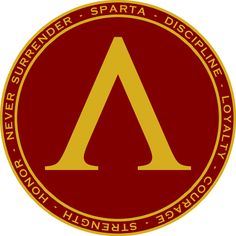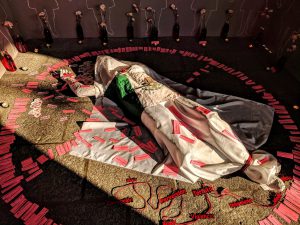Around 800 B.C.E., the Greek people were emerging as an Aegean power because of the growth of their many urban centers: city-states called poleis. These poleis functioned as principle centers for Greek societies. They varied in their political views and cultural practices from one another. One of the most important of the Greek city-states was the polis of Sparta.
Sparta was a part of a region called Laconia, which was located on the fertile peninsula in Greece called the Peloponnese. Although the Spartans were landlocked, they had the ability to use the Gyethio harbor when needed, along with the Evrotas River as a source of fresh water. Spartans had neighbors called helots, who were the descendants of the earlier Greek immigrants to Laconia. The helots were defeated by the Spartans, and were forced to serve as slaves to the Spartan community, and were not recognized as equal members of the Spartan society. Another group of people who were living within the Spartan society were called the Perioeci people. Their name translates to dwellers around, and they worked as traders and craftsman in the community, but were not citizens of the land of Sparta either. The Spartan exploitation of the helots allowed them to live a lifestyle of simplicity, frugality, and austerity. From this lifestyle, the Spartans were able to create an educational system they called the Agoge.1

The Agoge was characterized by the way Spartans raised their children and how they educated them. Their educational system emphasized physical education, warfare, and how to survive as a warrior. This was the toughest test one could face at the time because the Spartan army was well known all throughout Greece as having the most fearless and toughest fighting men in the world. Before a male child went through the hardships of the educational system, the child faced his first test at birth. Once the child was born it would be bathed in wine to determine if the baby would be strong enough to go through the hardships of becoming a Spartan warrior.2 Once the child survived, the elders who ruled Sparta would examine the baby for any birth defects or any blemishes that the baby might have. If the baby did not survive the wine bath or the Elder assessment, the baby was sent down to Mount Taygetos to perish.

If one were born a male, one would be raised mainly by one’s mother until reaching the age of seven. Boys were then sent to military training, or the Agoge. They were forced to learn to survive on their own, create their own meals, and learn to fight in the worst of conditions. During the Agoge, young Spartans would learn to overcome their fears by never showing weakness and trusting only a Spartan. The boys would also dine and be exposed to the lifestyle of a Spartan soldier and learn how to conduct oneself as a Spartan solider in society.3 By the age of twenty, males were encouraged to marry and have children. In order to fulfill this expectation of creating a family, the young soldiers were forced to sneak out of their barracks and return to the city to see the females. The young soldiers had to sneak out because their Agoge camp was away from the city and the trainees had to remain there until their training was completed.
By this age the soldiers were showing promise to their elders. The elders would let them start their membership to the syssitia, or clubs that had to do with dining hall messes and social religious groups within the city. The syssitias were already established through the army. The boys were placed or drafted into these different syssitias. Once placed into their syssitias, the boys would finish their training in these syssistias and learn how their new unit contributed to Spartan society. However, Spartan men were not considered or thought of as citizens until they reached the age of thirty. Once they were thirty, the trainees would become a full time soldier and full-membered citizens. Once this happened, they were allowed to participate in their new syssitia. It was an honor to participate in the mess hall because it shows that one was strong enough to provide for one’s family and for the community. Also, one belonged to a troop and had rank within the society. Even though they were seen as equals within the community, the men were not yet allowed to sleep with their wives overnight. The men were forced to sleep in quarters that housed each different syssitia. Now as an active soldier and equal in society, one served the Spartan army until the age of sixty.4 By the age of sixty, Spartans focused on their family and helped groom other young men that were in the process of becoming Spartan warriors. When serving the Sparta military, they held to the motto to come back victorious or die trying to be.
Although Sparta was a small polis within Greece, it was still able to be a prosperous and feared power in Greece. The Sparta population was about fifty to sixty thousand, which included the helots and Perioeci people. The Spartans only made up about fifteen thousand of that sixty thousand population. They were outnumbered sixteen to one, but were able to maintain order and peace through their strong and feared soldiers. This characteristic was admired by other city-states within Greece, many of whom took that admiration to forms of imitation. These traits that the Spartans would show and live by would eventually be copied or altered by others for a way of living or a way to build a strong army.
- Stephen Hodkinson, Anton Powell, and Jacqueline Christien, Sparta & War (Classical Press of Wales, 2006), 56-62, 102-126. ↵
- Maurice Pope, “Spartan details of daily life,” Times Higher Education Supplement no. 1626 (2004): 35. ↵
- John Buckler, Aegean Greece in the Fourth Century BC (Boston: Brill, 2003), 187-195, 203-210, 228-231. ↵
- Anton Powell, Athens and Sparta: Constructing Greek Political and Social History from 478 BC (Routledge, 2016), 78-93, 147-158, 303-331. ↵



51 comments
Johnanthony Hernandez
With the Spartans being seen as the ultimate example of what a warrior should be across militaries past and present. Your article shows why that is so, no military would begin training its soldiers at the age of seven now, but the way the Spartans did it ensured that those defending Sparta would be able to hold their own. Few know the brutality of their training and the thought of training soldiers like that now is unthinkable.
Christopher King
I found it interesting of how the men were raised. They truly lived as survival of the fittest. I knew they went through incredibly tough training and were perceived differently from other Greeks but I did not know they could not be considered a spartan citizen until 30 or that they could not live with their wives. An interesting article for sure.
Oceane Roux
Thank you for this article! I always love to learn about ancient civilizations. I have heard about the process of becoming a Spartan Warrior before reading this article, but I really enjoyed reading this article as it goes beyond what I knew. It is amazing how strict the Spartans were especially when it comes to war and being a soldier.
Alexis Renteria
I really enjoyed reading this article and learning more about the Spartans. I found it interesting how strict their rules were like the wine bath. Its crazy how if the newborn child didn’t pass the wine bath test, they would be left to die at the mountain. And even if the newborn passed the test, he would still be left to die if he had any informalities. Additionally, they had to go through a series of tests to test their abilities and qualify as a strong Spartan soldier. This just goes to show how much it meant to the Spartans being a superior empire.
Aaiyanna Johnson
I enjoyed this article, it was a delightful read. learned so many things from it. I did not know they planned the boys’ years, even while they well into their adulthood. I knew the babies were tested, but I did not know they were tested twice. They had life plans from the moment of birth, they had a keen system of order.
Rebekah Esquivel
This article was super interesting! I love reading stuff and watching movies about the history of the Spartans. I find it so crazy how depending on how children were born and if they could survive the wine bath, determined of if they would be kept or sent off to a mountain to die. These warriors had no intentions of taking care of non healthy babies even from the beginning. I have seen movies about becoming a spartan and saw from their that it was not easy. However, reading this article provided more detail and reasons of why it was so hard becoming a spartan.
Jazmin Pizana
Very interesting article! I know little about the Spartans besides the time when I watched the movie 300. I briefly remember talking about the Spartans back in high school and remember going over the physical and mental training they had to endure at an early age. I didn’t know about the tests that the elders put them through at birth, especially the bathing in wine.
Andrea Chavez
It is very interesting to see how intense the army was, and how seriously they took everything. In a way it’s sad that a man was finally free from his duty of soldier to the age of 60. Usually people stop being strong and active enough to be a soldier around the age of 40. It also makes me consider how lonely and sad must the wife be without her husband.
Joshua Breard
I think that this article was very interesting as it provided a detailed description of what it meant to be a Spartan warrior from being raised by their mothers till age 8 to the various physical challenges, the Spartans were definitely a force to not be taken easy. Greek history like this is very interesting as some of the these correlate to how we do military training today. Great article!
Tyler Sleeter
Really great article. It has always interested me and concerned me that the Spartans judged their infants at birth, and if found unfit, they were disposed as if trash. It surprised me learn that all Spartans were warriors while the craftsmen and tradesmen were either slaves or another group that lived near the Spartans. It reminds me of driving around modern-day military bases and seeing all the shops just outside the base that are set up to serve the soldiers. I do like that the soldiers were trained to be both physically and mentally strong because I believe that both are important to a successful army.